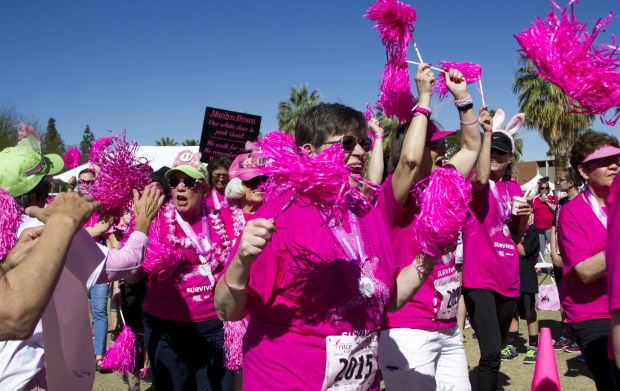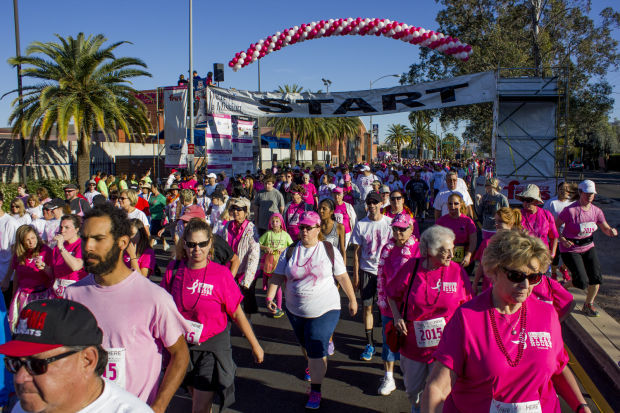Last week, the breast cancer nonprofit Susan G. Komen Arizona announced that it will close its doors here on July 31.
The closure of Susan G. Komen Arizona and the subsequent cancellation of Race for the Cure in Phoenix this fall followed an announcement in December about the end of Tucson's own race, previously scheduled for March 2017.
"Cancelling the Tucson race was independent of what just happened..." said Christina Mencuccini, the executive director of Susan G. Komen Arizona. "Back in December we didn't see this happening. Our presence in Tucson had changed tremendously."
That Tucson cancellation came about a year after the 2015 merger of Komen Southern Arizona and Komen Central and Northern Arizona into Susan G. Komen Arizona. In December of 2016, the organization cited a decline in attendance at the fundraising 5K in Tucson.
The decision to leave the state followed "a decline in overall fundraising and revenue and event participation," Mencuccini said.
The yet-to-be-seen impact on Tucson will be whether local organizations receiving funding from the Arizona affiliate will continue to get financial support from the Dallas-based Susan G. Komen headquarters.
This year, the Arizona affiliate awarded $418,997 in grants for preventing and treating breast cancer, according to press materials. Those organizations will continue to receive funding through March 2018.
“We are saddened that the Susan G. Komen Arizona office is closing," wrote Jane Bakos, the CEO of St. Elizabeth's Health Center in a prepared statement. "We have counted on its support to provide breast cancer treatment to our uninsured patients for many years. We hope that we are able to apply to the national Komen office for treatment grants in the future, and that the local community will continue to support our patients."
This year, St. Elizabeth's received $50,000 from Susan G. Komen Arizona for its work in treating breast cancer. Bakos noted that financial support for cancer treatment, including breast cancer, also comes from groups such as Quilt for a Cause, Inc., Beta Sigma Phi and Tucson Riders 4 the Cure.
The Pima County Health Department and Tucson Medical Center were the other Pima County institutions listed as grant recipients this year, out of nine total.
Mencuccini said the local office is currently working with headquarters to figure out how to continue supporting Arizona organizations.

Families, friends, community members and breast cancer survivors line up on Campbell Ave. start their 5K run or walk during Susan G. Komen's 17th annual Race for the Cure against breast cancer on Sunday, March 22, 2015.
"The loss of Komen in Southern Arizona will be felt by the community as far as support and outreach, but not by the research community," wrote Joyce Schroeder, the director of Metastatic Breast Cancer Initiative at the University of Arizona's Cancer Center, in an email. "This is because it is the national Komen, not the local affiliates, that supports scientific research into breast cancer. As long as Komen continues to fund grants nationally, the research community will continue to garner support."
About 13 years ago, her own research on breast cancer metastasis was funded by Komen for several years.
Cody Cassidy, the director of communications and public affairs for the Cancer Center, said it does receive some funding from the national organization for research.
"The loss to our local community by Komen leaving Arizona includes the loss of the sense of community the race and other events built for the patients and their families, as well as the ability of the local affiliates to fund low-income mammogram screenings and educational programs," Schroeder added.
In December, Mencuccini told the Arizona Daily Star that 75 percent of the Susan G. Komen Arizona's general fund is distributed locally.
"The remainder of the general fund supports the closure," she said. "It goes out to community the best as we can, but we still have staff, and we need to work through the actual closure."
October's race in Phoenix would have been the 25th Race for the Cure in the State. Tucson had hosted races since 1998.
Tucsonan Terry Filipowicz attended races for almost 10 years in Sacramento and then a year or so in Tucson before she decided she no longer liked how corporate the event felt.
She started going in the late 90s after a coworker died of breast cancer.
"It was great experience," she says. "It was bonding and felt like everything going toward a good cause. It was a sisterhood and brotherhood and after years of that, there just seemed to be a little bit of a shift and it felt less authentic."
She began focusing her philanthropy more on under-served charities, especially locally.
Randy Accetta, founder of Run Tucson and director of coaching education at Road Runners Club of America, ran in Tucson's Race for the Cure from its very earliest years and emceed several of those races.
He says the running community joked that it wasn't a race and fundraised more for an organization than a cure, but he still thought it brought the community together in a powerful way. He would know. He organizes a number of popular races in town and helped found Meet Me at Maynards.
"My big thing with Tucson is making it a place that is worth living in and trying to make a community out of it," he says. "I think Race for the Cure did as good a job as a UA basketball game for bringing people together."
Over the years, Susan G. Komen has taken heat for a variety of reasons, including the high pay of its CEO, the concept of "pinkwashing" by companies whose products might contribute to cancer and a decision in 2012 to stop funding Planned Parenthood breast screenings. That decision was revoked.
The announcement of the closure on Facebook was greeted by a mixture of sadness and jeers from those impacted by the nonprofit and those disillusioned with its practices.
"It’s important to recognize all of the support over the years and really acknowledge the people that have allowed us to touch them and those that have touched us along the way by inviting us into their journey with breast cancer," Mencucinni said.





